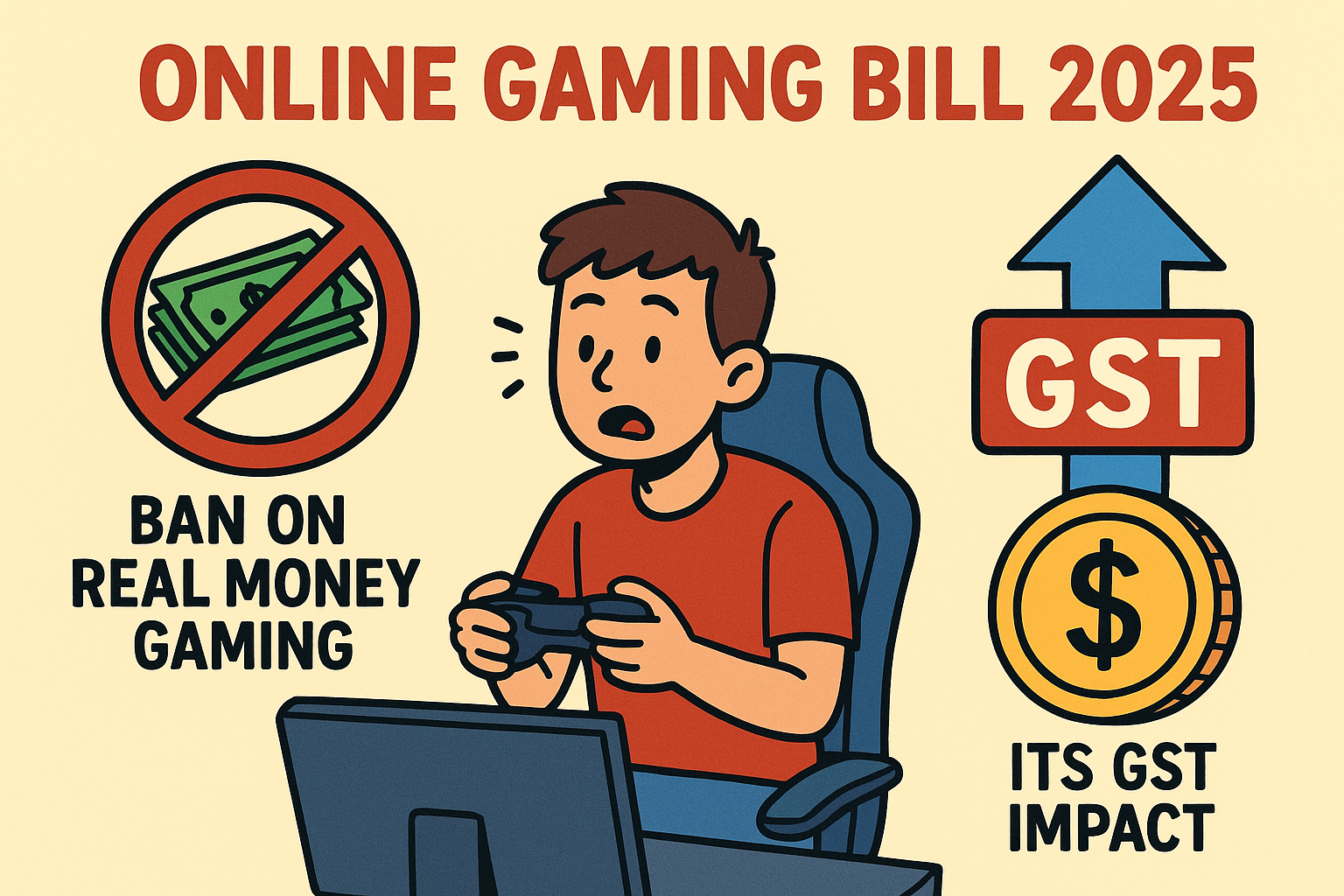Online gaming has been one of the fastest-growing industries in India, with millions of users playing fantasy sports, rummy, poker, and casino-style apps. However, concerns about addiction, financial losses, and tax evasion pushed the government to take strong action.
In August 2025, the Government of India officially announced the Online Gaming Bill 2025, which brings strict regulations and a complete ban on real-money online gaming. Along with this, the decision has a direct and huge impact on GST collections.
Table of Contents
Why the Ban on Real Money Gaming?
The government stated several reasons behind this strong step:
- Addiction & Financial Stress: Young players and families were losing large sums of money in real-money betting apps.
- Illegal Betting Apps: Many offshore platforms were operating without paying Indian taxes.
- Money Laundering Concerns: Real-money gaming apps were misused for black money transactions.
- Consumer Protection: Lack of KYC checks allowed underage users to participate in gambling-like games.
Thus, the bill aims to create a safe and transparent digital gaming ecosystem in India.
Key Features of the Online Gaming Bill 2025
- Ban on Real-Money Gaming
- Any online game that involves depositing or wagering real money is now banned.
- This includes fantasy sports, poker, rummy, and casino-like apps.
- Only Skill-Based & Free Games Allowed
- Esports, chess, carrom, educational games, and skill contests are still permitted.
- These must be either free-to-play or run on a subscription/ad-based model.
- 28% GST for Permitted Platforms
- GST continues at 28%, but now applies only to allowed games (subscriptions, in-app purchases, ad revenues).
- Mandatory KYC & Age Verification
- Players must complete KYC (Know Your Customer).
- Games will be strictly 18+ only.
- Heavy Penalties
- Running or promoting real-money gaming apps can lead to fines up to ₹50 crore and jail up to 5 years.
- Offshore apps will be blocked immediately by MEITY (Ministry of Electronics & IT).
Impact on GST Collections
1. Major Drop in GST Revenue
- Earlier, GST at 28% on deposits (face value) from real-money apps contributed huge revenue.
- With the ban, the government could lose ₹10,000–15,000 crore annually in GST collections.
2. Narrower Tax Base
- Now, GST will apply only to subscription-based or free-to-play skill games.
- These generate much less tax compared to cash-deposit games.
3. Reduction in GST Evasion
- Many foreign betting apps were avoiding GST.
- With the ban and strict blocking orders, illegal GST leakage may reduce, but overall tax income will still be lower.
4. Industry Pushback
- Gaming startups argue that instead of a ban, the government could have allowed regulated real-money gaming, ensuring both player safety and GST revenue.
- The ban might kill jobs, discourage investors, and push players towards illegal offshore apps.
Impact on Industry & Players
- Startups & Platforms: Many fantasy sports and rummy startups may shut down or completely change their model.
- Investors: Billions of dollars invested in the Indian gaming industry are now at risk.
- Players: Gamers who enjoyed cash-based contests will have fewer options and may move to illegal apps if not monitored.
- Esports & Free Games: This category will now grow faster, as the government supports non-monetary skill-based gaming.
Future Outlook
The ban on real-money gaming is a bold move. While it ensures consumer protection and reduces gambling risks, it also leads to a big loss in GST revenue.
Experts believe that the government may, in the future, consider a regulated model instead of a complete ban, where:
- Only licensed companies can run real-money apps.
- GST is levied on Gross Gaming Revenue (GGR) instead of deposits.
- Strict KYC and deposit limits protect players.
Conclusion
The Online Gaming Bill 2025 has completely changed India’s gaming industry. By banning real-money online gaming, the government aims to protect citizens from gambling harm, but at the cost of losing thousands of crores in GST collections.
The challenge now is to balance regulation, taxation, and industry growth. Whether this ban strengthens India’s digital economy or pushes users to underground apps will only be clear in the coming years.
Contact taxgiveindia.com for gst related services.
